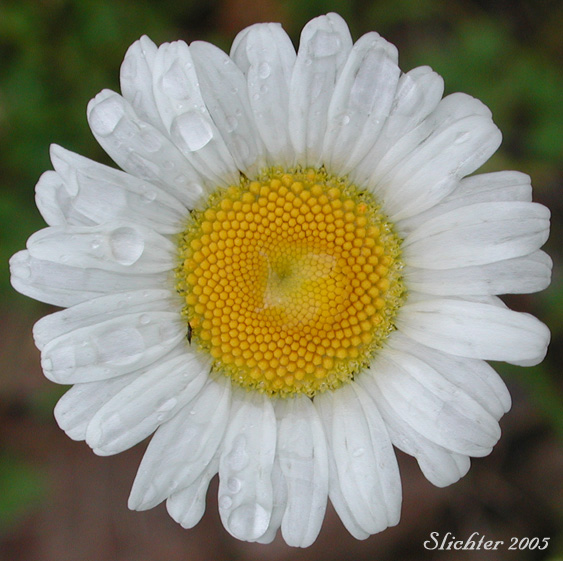[Members of the Sunflower
Family with Daisy-like Flower Heads East of the Cascade Mountains of Oregon and Washington]
Oxeye Daisy, Oxeye Daisy, Ox-eye Daisy
Leucanthemum vulgare
Synonyms: Chrysanthemum leucanthemum, Chrysanthemum leucanthemum var. pinnatifidum

The photo above shows a close-up of the flower head of ox-eye
daisy as seen near 4000' at the southwestern corner of Mt. Adams. Note the numerous
small, yellow disk flowers as well as the ring of long, white ray flowers at
the outer edge of the disk. Photographed on July 10, 2005.
Characteristics:
Ox-eye daisy is an attractive, weedy perennial.
It has erect stems ranging from 20-80 cm in height, often unbranched. It is
mostly glabrous. The basal leaves are oblanceolate or spatulate with wavy
or cleft or lobed margins. The leaves are 4-15 cm long. The stem leaves are
sessile and reduced in size.
The flower heads are solitary at the end of the
branches. The 15-30 white rays surround the yellow central disk. The rays
are 1-2 cm long, and the disk is about 10-20 mm wide.
Habitat:
Ox-eye daisy is found in disturbed areas, such
as fields, roadside, and waste areas.
Range:
Ox-eye daisy is a native of Eurasia. It is widespread
over much of North America.

The photo above shows a close-up of the basal
leaf of oxeye daisy. Note the lobed to incised leaf margins. The foliage, especially
when younger, is often a much darker green color.
Paul Slichter